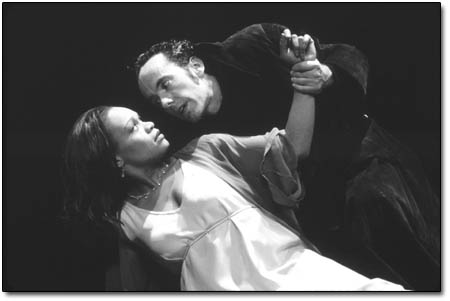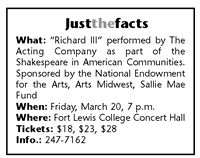|
New York company to perform "Richard
III" locally next spring
by Amy Maestas
 |
| Durango is one of 100
communities in the nation that has been selected for
a National Endowment of the Arts initiative entitled
“Shakespeare in American Communities.”
Players from the New York-based The Acting Company,
pictured above, will perform “Richard III”
on March 20 at Fort Lewis College./photo by Carol
Rosegg. |
William Shakespeare may have written about
the “winter of our discontent,” but early
this spring, Durango audiences will find themselves contented
with a special performance of the Bard’s play as
presented by the famous New York-based The Acting Company.
On March 20, The Acting Company will make a tour stop
at Fort Lewis College to entertain locals with a production
of “Richard III,” a historical play that highlights
the conflict between good and evil, plotting and betrayal,
crime and punishment. The  performance
is part of the newly created “Shakespeare in American
Communities,” a $17-million initiative of the National
Endowment for the Arts. The tour presents four plays by
six theater companies, which will be performed in only
100 small- and mid-sized communities across the country.
Durango is among them. performance
is part of the newly created “Shakespeare in American
Communities,” a $17-million initiative of the National
Endowment for the Arts. The tour presents four plays by
six theater companies, which will be performed in only
100 small- and mid-sized communities across the country.
Durango is among them.
“This is a great resource,” says Kathryn
Moller, associate professor of theatre at Fort Lewis College
and director of the Durango Shakespeare Festival. “Shakespeare
is a great resource because of the connection to our own
history.”
Though there will be only a single performance in Durango,
the production will be a brief replacement for Shakespeare
lovers, because the Durango Shakespeare Festival will
not take place in 2004. Moller says that the festival
continues to fall short of adequate funding and remains
on hiatus until it can be restored. She welcomes the tour
with hopes that it will raise awareness of the local theatrical
community and lead to larger audiences.
The NEA, along with its cooperating partner, Arts Midwest,
intends to introduce Shakespeare and his literary works
some 400-plus years old to a new generation of Americans.
To achieve this, the tour will be supplemented with workshops
and symposia about the productions, as well as educational
programs for local schools. That means Durango school-aged
children will be exposed to the life of Shakespeare and
his literary influence on England’s theater scene
from the late 1500s to the early 1600s.
‘All the world’s a stage’
The Acting Company, founded by John Houseman, joins five
other prestigious theater companies in the country to
participate in this tour. Other plays that will be presented
in other communities include “Othello,” “Romeo
and Juliet” and “A Midsummer NightDream.”
Other participating companies include the Chicago Shakespeare
Theater and the Guthrie Theater in Minneapolis.
The award-winning Acting Company, based in New York,
is known for its repertory of classical productions reaching
audiences of 70,000 people or more. It boasts such famous
alumni as Kevin Kline, Patti LuPone and David Ogden Stiers.
For years, this company and others have made Shakespeare’s
plays part of their seasonal productions, keeping American
theaters active in a tradition the Bard started centuries
ago. Historians attribute Shakespeare with creating a
vibrant theater scene in London, which eventually transcended
borders and continents. Ultimately, the playwright became
the most celebrated author in Western civilization.
When he died at age 52, Shakespeare’s body of work
included 38 plays, 154 sonnets and two narrative poems.
He not only wrote the plays that actors performed, he
often was on stage with them. Because audiences loyally
supported him, Elizabethan theater blossomed into a central
theme of the Elizabethan social life, which later paved
the way for professional companies to become stable business
organizations.
Besides influencing theater companies, historians also
believe that themes in Shakespeare’s plays are timeless.
Indeed, the playwright’s thoughts, themes and lessons
are as easily identifiable in today’s world as they
were more than 400 years ago – young love is precious,
family is dear, power corrupts, jealousy is fatal, parting
is sweet sorrow and all is well that ends well.
According to the NEA’s synopsis, “Richard
III” is a drama that historians believe was first
performed in 1592 but not printed until 1597. Based on
actual historical events from the year 1485, when the
Tudor monarchy took hold, the play takes place after a
long period of civil unrest in England. Once peace is
restored under King Edward IV, his younger brother Richard
resents Edward’s power. He schemes to wrest power
from his brother and take over as king. When Edward becomes
sick, Richard accelerates his poor health and eventually
sends him to an early grave. Richard, of course, becomes
interim ruler of England – but only until Edward’s
sons reach ages when they can rule. Still, Richard continues
his conniving behavior; he has his nephews imprisoned
and killed. Richard’s personal vendettas do not
serve him well. His killing spree ends when the Earl of
Richmond, who becomes the new King of England, kills him
in an invasion.
‘It’s Greek to me’
Dana Gioia, chairman for the National Endowment for the
Arts, believes that Shakespeare’s themes remain
relevant and his influence as a dramatist is still high,
but the language in which his works were written is not
in the modern-day vernacular. As a result, the Shakespeare
in American Communities tour is helping school teachers
fashion lessons about the Elizabethan period.
The NEA is making a teacher’s guide available that
includes classroom activities and history lessons, as
well as fact sheets and an educational video. Particularly
important, Gioia says, is for students to learn how to
interpret the dialect of the sonnets, plays and poems.
With this understanding, he continues, students might
be less turned off by the plays and more turned on to
the idea of recognizing the parallel themes between modern-day
society and the Elizabethans.
“That’s going to be essential,” Moller
says, “because the histories are long and complicated.
You need some background education about the period and
things like the Tudor monarchy.”
Says Gioia: “One great teacher can change a student’s
life.” With teachers helping students understand
the Bard’s plays in a modern context, supporters
of the tour believe all generations of Americans can expand
their knowledge about this time in theatrical history.
“It will inspire young and old to attend subsequent
theatrical productions together,” says Gioia.
|

